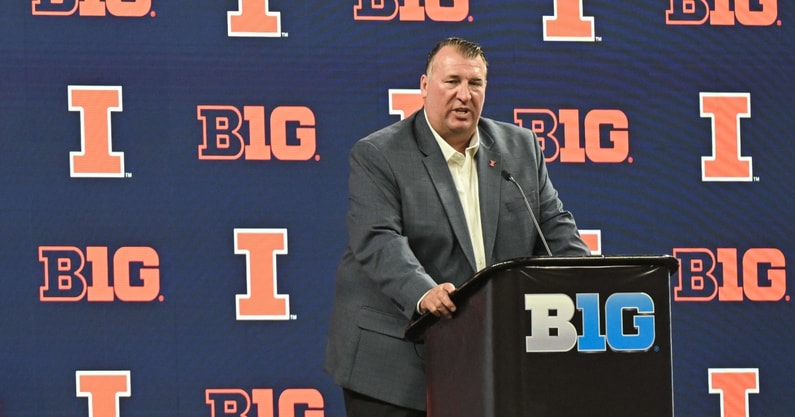Bret Bielema addresses what separates Big Ten, SEC having coached in both leagues

There are currently two conferences clearly atop the college football pyramid, the SEC and the Big Ten. Those are both conferences that current Illinois Fighting Illini head coach Bret Bielema has experience coaching in, and ones he sees plenty to appreciate about.
Recently, Bielema appeared on The Triple Option. There, Mark Ingram asked him to compare the two conferences, though he pushed back on that, emphasizing that they’re both great for their own reasons.
“I get it, you’ve got to drive likes and value and all that goes into your podcast,” Bret Bielema said. “But, really, it’s like arguing about two premium businesses. Whether you like Chevy or Ford or maybe it’s more of a Jaguar or a Rolls-Royce. Whatever you want to say, two incredibly gifted leagues. The passion from their fan bases is unparalleled.”
Bret Bielema is an Illinois native who played for Iowa in the late 1980s and early 1990s. That’s also where he got his coaching start before he got his first head coaching job with Wisconsin in 2006. After the 2012 season, he’d leave for Arkansas and the SEC, and he’d spend five seasons there. Now, he finds himself going into his fifth year at Illinois, coming off a 10-win season.
While both conferences have their merits, Bielema did see a difference in the stadiums that each conference has. In particular, how the community size and passion changed the experience.
“The difference I would say that jumps out right away is just the venues you play in. Like Ohio State‘s an incredible stadium and Michigan, you know,” Bielema said. “The Big House is a great stadium. I think our place is going to turn into that. We just had our first sellout in over 20 years, but in the SEC it’s those small market values, right? And the passion in those little [communities]. A hotel when you play in the Big Ten is 20 minutes. When you go to the SEC, and you might have to driven an hour and a half to get to the hotel that you could stay at. That literally said something to me right away.”
Another key difference has ended up being the weather. The Big Ten has winter conditions to play in, which the SEC doesn’t deal with in nearly the same way. That adds its own unique challenge.
Top 10
- 1Breaking
CFP Top 25
New official rankings revealed
- 2New
College Football Playoff
Official third 12-team bracket
- 3
Dante Moore
Getting it right the 2nd time
- 4Hot
Sam Leavitt
2026 return to ASU 'doubtful'
- 5Trending
Lane Kiffin
Responds to deadline reports
Get the Daily On3 Newsletter in your inbox every morning
By clicking "Subscribe to Newsletter", I agree to On3's Privacy Notice, Terms, and use of my personal information described therein.
“But the fanbases, the way they follow their people,” Bielema said. “Obviously, in the South, one thing is that everything is played in what I would say is conducive weather environments. In the North, in the Big Ten, you’re gonna play in bad weather with the cold. You’re gonna play in all four seasons. You’re going to play in all four time zones now.”
That weather can impact recruiting too. As Bielema explained, even though many people would prefer warmer weather, he could use the bad weather for a recruiting pitch. After all, Big Ten players have proven themselves in all climates to the NFL.
“We’re really different than the SEC in that model is, and for me, I use this one all the time. If I was recruiting a young Mark Ingram again,” Bielema said. “And if it was down to Wisconsin and Alabama, I would just share with him that, hey, you’re going to prove to 32 NFL teams that you can play in all types of climates and weather. You go to the South and you play at Alabama, you’re really playing in that environment year round, you’re training in it, you’re living in it. So, if the New York Giants, the Jets, the Vikings, the Packers, the Seahawks, the Chiefs, want to select someone, they’re going to want someone who plays in all four seasons and has proven that they can do it.”
Between Wisconsin and Illinois, Bret Bielema has a record of 55-37 in Big Ten play. He’s also 11-29 in SEC play from his time at Arkansas. So, he’s clearly had more success up North than down South. That doesn’t mean he can’t appreciate both conferences, though.
“So, there is a little bit of an advantage there,” Bielema said. “But otherwise two really premium conferences for all the right reasons.”